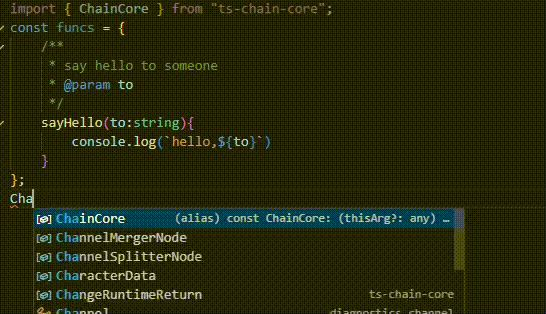English | 简体中文
ts-chain-core
这是一个typescript链式编程的基础库,从随手编写的小工具到称手的工具集合都可以用它来完成
特性
- 用最小的代码就能实现链式编程
- 节省代码量:在一些场合中,使用本库编写的工具可以使实际代码量减少一半甚至更多
-
💥💥扩展接口自动补全 无需事先定义你撰写的接口,即可在书写过程中获得代码补全!下面是实际效果展示(环境:vscode,无特殊插件)

- 🌈上手简单 你只要掌握三个核心的api就可以编写出满足大部分需求的链式接口。
-
🚀小巧 程序本体压缩后仅
3kb大小。
快速开始
安装
npm i ts-chain-core####基本用法
import { ChainCore } from "ts-chain-core";
ChainCore(null)
.setFunction((name: string) => {
console.log(`hello,${name}`);
})
('🍉')
('🍍')
('🥭')将类方法直接转换成链式方法
class Example {
toChain(){
return ChainCore(this).extendFunctionsFromObject(Example)
}
add(a:number,b:number){
console.log(a+b)
}
addOne(a:number){
return (b:number)=>{
console.log(a+b)
}
}
addEnd(a:number,b:number){
return a+b;
}
}
new Example().toChain()
.add(3,5) //8
.add(4,7) //11
.addOne(4)
(5) //9
(6) //10
(7) //11
.addEnd(11,10) //chain ended here
.add(42,1) //❌error, chain function break扩展时,根据根据方法返回类型不同,会生成不同的链式方法
| 返回值类型 | undefined/void | function | 其他类型 |
|---|---|---|---|
| 修改()操作 | 否 | function设置为()操作 | 否 |
| 终止链式反应 | 否 | 否 | 是 |
但是()操作的返回不论是什么类型都不会再次修改()操作
扩展实例方法
在扩展方法里面,你也许需要调用ChainCore已经扩展的方法或者ChainCore自有的方法,在这种方法中,你需要在入口参数中增加一个ChainCore的引用。
ChainCore提供了一个方法来扩展这种方法,并在该方法被调用时自动传入ChainCore实例,我们把这种方法称为实例方法
扩展方法举例
ChainCore(null).extendFunctionsFromObject({
sayHello: (name: string) => {
console.log(`hello,${name}`);
},
}).extendInstanceFunctions({
/**
* play a scenario
* @param ch passed by `ChainCore` and reference to itself
* @param time
* @param place
* @param to
*/
play(ch,time:string,place:string,to:string){
console.log(`This is ${time},${place}`);
ch.sayHello(to)
}
}).play('morning','garden','🍓')扩展实例方法里的第一个入口参数,要预留给ts-chain-core,它不用标注类型,在调用时不用传入
扩展方法中的回调
你也许需要在扩展方法中的回调中访问ChainCore的方法,以下是上一个例子的不同的实现方式
ChainCore(null).extendFunctionsFromObject({
sayHello: (name: string) => {
console.log(`hello,${name}`);
},
}).extendInstanceFunctions({
/**
* play a scenario
* @param ch passed by `ChainCore` and reference to itself
* @param fn play anything you wanted in this function
*/
play(ch,fn:(ch:CurrentStateChainRef)=>void){
fn.apply(null,[ch]);
}
}).play((ch)=>{
console.log(`This is morning,garden`);
ch.sayHello('🍓')
}) 回调函数中的第一个参数标注为CurrentStateChainRef类型,在调用时,传入的ChainCore将自动获得此前之前扩展方法的代码提示。
实例方法同样可以设置()操作,()操作中同样也可以使用回调访问ChainCore实例
ChainCore(null).extendFunctionsFromObject({
sayHello: (name: string) => {
console.log(`hello,${name}`);
},
}).extendInstanceFunctions({
play(ch){
return (fn:(ch:CurrentStateChainRef,time:string,place:string,to:string)=>void,time:string,place:string,to:string)=>{
fn.apply(null,[ch,time,place,to]);
}
}
}).play()((ch,time,place,to)=>{
console.log(`This is ${time},${place}`);
ch.sayHello(to)
},'morning','garden','🍓');限制注意📢📢 回调函数中的ChainCore实例是由扩展方法自身传入的,你可以不必在第一位传入ChainCore实例,但是我们约定只有在第一位的参数类型标注为CurrentStateChainRef,才会转换成当前的ChainCore类型
📑类型自动转换
ts-chain-core通过类型映射技术(remapping)来实现类型自动转换,以提供方便的自动补全功能,CurrentStateChainRef是一个例子。在后面还会看到更多例子。
然而该技术存在一定局限性。首先,当前typescript存在的限制,让所有的参数都实现自动转换是不切实际的,在保证使用和运算量之间做了权衡,该功能目前只能提供给函数返回类型和入参的前四个。在绝大多数情况下,这是够用的。
另外remapping也不支持泛型映射,但ts-chain-core提供了一套解决方案,后面会提到。
🔍ChainCore类型声明
由于ChainCore是一个比较复杂的类型,但有时候的你的代码中需要声明扩展了某些方法的ChainCore类型,在绝大多数情况下,直接书写ChainCore类型是不被推荐的,因为过于复杂。这里推荐用类型推导的方式来进行声明
//声明示例
function chainFactory(){
return ChainCore(null).extendFunctionsFromObject({
sayHello: (name: string) => {
console.log(`hello,${name}`);
},
//some other functions
})
}
type MyChainType = ReturnType<typeof chainFactory>;
function myFunction(ch:MyChainType){
ch.sayHello('')
}🔍thisArg
thisArg是ChainCore的内置变量,用于设置运行方法中的this
它可以通过ChainCore()传入,也可以通过getThis()和setThis()在运行中修改和访问
arguments cache
为了避免重复的输入,ts-chain-core的运行时缓存了上一次调用的参数,参数不传入或传入undefined时,ChainCore会传入上一次传入的值作为替代
UIKit(this)
.show()
('myUsernameEditor',props.mode==='edit') //show these controls when user need edit
('myAddressEditor')
('myEmailEditor')
('myPhotoEditBtn')
('myUsernameLabel',props.mode==='view') //show these controls when just read
('myAddressLabel')
('myEmailLabel')在大多数场合下,这个特性确实很有帮助,但是在有些场合,它可能会产生一些令人困惑的结果,并让人误认为是程序的bug
ChainCore(null)
.extendInstanceFunctions({
log(ch,...args:any){
console.log(...args)
}
})
//confused output
.log('a','b','c') // stdout: a b c
.log('d') // stdout: d b c
.log(undefined,'e',undefined) // stdout: d e cts-chain-core提供了clearArgCache()方法用于清空上一次的缓存
//proper version
ChainCore(null)
.extendInstanceFunctions({
log(ch,...args:any){
ch.clearArgCache();
console.log(...args)
}
})
.log('a','b','c') // stdout: a b c
.log('d') // stdout: d
.log(undefined,'e',undefined) // stdout: e 你也可以在调用它来清除潜在的内存泄露
const persistChainInstance = ChainCore(null)
.extendInstanceFunctions({
on(ch,obj:any,eventName:string,fun:Function){
ch.clearArgCache(); //prevent fun be cached
obj.addEventListener(eventName,fun)
}
})访问cache arguments
ChainCore(null)
.setFunction((...args:any[])=>console.log(...args))
('a really really really really long expression') //a really really really really long expression
(CacheValue(x=>'🎄'+x+'🎄')) //🎄a really really really really long expression🎄
(CacheValue(x=>'✨'+x+'✨')) //✨🎄a really really really really long expression🎄✨批量调用方法
ts-chain-core提供了两个批量调用()操作的方法,请看示例
ChainCore(null)
.setFunction((m: number, n?: number) => {
console.log(Math.pow(m, n || 0));
})
.batch([3, 4], [1, 2], [5, 6], [1], [2], [3]);
ChainCore(null)
.setFunction((m: number, n?: number) => {
console.log(Math.pow(m, n || 0));
})
.zipBatch([1, 2, 3, 4, 5, 6], [2]);
//equal to
.batch([1,2],[2],[3],[4],[5],[6]);批量调用仍然遵循参数缓存原则
扩展运行时
ChainCore的运行时除了thisArg和arguments cache之外,还运行使用者进行扩展,扩展的属性通过runtime接口进行访问
const ch = ChainCore(null)
.extendRuntime<{value:string}>() //extend a field names `value`
.extendInstanceFunctions({
setValue(ch,value:string){
ch.runtime.value = value; //write to value
},
getValue(ch){
return ch.runtime.value; //access value
}
});
const result = ch.setValue('hello').getValue();
console.log(result) //hello🚀扩展运行时类型动态修改和指向
在一些应用中,无法事先确认数据的具体类型,比如,你要做一个对数组进行操作的函数库,
在定义方法的时候,无法指明需要操作的类型 (这要求泛型参数能够动态调整,这一点对于目前的typescript来说是做不到的)*。ts-chain-core提供了引用扩展运行时类型的方法ReferTo<>和动态修改运行时类型的方法ChangeChainRuntime<,>来达成目的,请看例子
const ch = ChainCore(null)
.extendRuntime<{group:any[]}>()
.extendInstanceFunctions({
/**
*
* @param ch
* @param value ReferTo<'<0>'> which means use the first generic type as input type
* @returns ChangeChainRuntime<'group','<0>'> means change runtime `group' type to first generic type
*/
group(ch,value:ReferTo<'<0>'>):ChangeChainRuntime<'group','<0>'>{
ch.runtime.group = value;
return ChangeRuntimeReturn(); //call this function to actually change runtime type
},
setToIndex(ch,value:ReferTo<'group[number]'>,index:number){
ch.runtime.group[index] = value;
},
each(ch,fn:(item:ReferTo<'group[number]'>,index?:number)=>void){
ch.runtime.group.forEach(fn);
}
});
ch.group([0,1,2,3]) //group<number[]> will change setToIndex and each's function parameter type to number
.setToIndex(42,0)
//.setToIndex('42',0) ❌error,'42' doesn't match type number
.each((item,index)=>{
console.log(index,item)
}) //output : 42,1,2,3你可能注意到,其实每个ts-chain-core扩展的方法都是泛型方法,泛型参数有四个,可以通过ReferTo<'<0>'>,ReferTo<'<1>'>,ReferTo<'<2>'>,ReferTo<'<3>'>来实现动态修改类型的目的,返回时用到ChangeChainRuntime则是用来修改运行参数的类型的。
🚀ReferTo<>语法
ReferTo<T[]>表示它是类型T的数组类型
ReferTo<T[number]> 表示它是类型T的数组元素类型.前提T必须是一个数组类型否则会得到错误类型提示
ReferTo还可以用路径符号::来表示一个复杂类型下面的某个属性的类型
下面是举例(此例仅做展示,并不表示一定需要用ReferTo<>来指向一个类型,除非它是一个需要用泛型来表达的类型)
ChainCore(null).extendRuntime<{
actor:{
name:string,
birthDate:Date,
movie:{
title:string,
year:number,
genre:[{id:number,key:string,name:string}]
}[]
}
}>()
.setFunction((input:ReferTo<'actor::movie[number]::genre[number]'>)=>{
console.log((input as any).name)
})
({id:1,key:'comedy',name:'comedy'})🚀多个扩展类型组合
使用ReMapTo<>将多个扩展运行时的属性的类型组合成一个新的类型
const v = ChainCore(null)
.extendRuntime<{name:string,age:number}>()
.extendInstanceFunctions({
setPerson(ch,values:ReMapTo<'name'|'age'>){
ch.runtime.age = (values as any).age;
ch.runtime.name = (values as any).name;
},
getPerson(ch):ReMapTo<'name'|'age'>{
return {...ch.runtime} as any;
}
})
.setPerson({name:'Amy',age:42})
.getPerson().name;
console.log(v) //Amy
